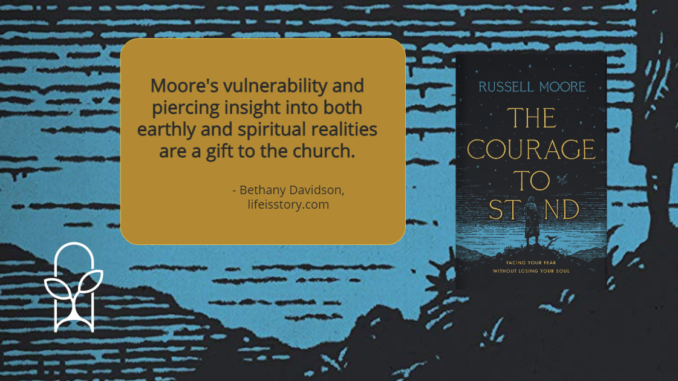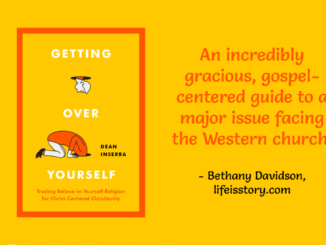
Published by B&H Publishing on October 6, 2020
Genres: Non-Fiction, Christian Life, Memoir, Theology
Buy on Amazon
Goodreads

DO NOT BE AFRAID. We live in a fearful and cowardly time. Some are anxious and withdrawn, seeking to escape the notice of whatever scares them. Others mask their fear with fighting and quarrelsomeness. The root of all of this fear is the fear that we might lose our belonging in whatever tribe in which we seek safety, the fear that we might have to stand alone.
The crisis we face is not a crisis of clarity but a crisis of courage. Our problem is not so much a lack of knowledge as a lack of nerve. And yet, Jesus told us that we are to stand with courage. That doesn’t mean that we will be fearless, but that we will know how to face our fear and keep walking toward the voice that calls us homeward. Gospel courage is nothing like the bravado of this anxious age. The call to courage is terrifying because the call to courage is a call to be crucified.
In The Courage to Stand, bestselling and award-winning author Russell Moore calls readers to a Christ-empowered courage by pointing the way to real freedom from fear—the way of the cross. That way means integrity through brokenness, community through loneliness, power through weakness, and a future through irrelevance.
On the other side of fear is freedom: the freedom to stand.
I have greatly enjoyed Russell Moore’s work for years, and this book was no exception. Like his other books, The Courage to Stand: Facing Your Fear without Losing Your Soul is vivid, biblical, and counter-cultural. This book focuses on the biblical story of Elijah, and Moore draws parallels between Elijah’s situation and struggles that Christians face today. He emphasizes that the answer to Elijah’s fears and despair lay ultimately in Christ, and helps his readers consider the ways that the cross of Christ transforms their fears, their terror of not belonging, their shame, the complexities of community, and the emotional baggage that we all carry from living in a broken world.
Although this book uses Elijah’s narrative as a consistent thread throughout, each chapter addresses a different topic. Some chapters will resonate more with some readers than others, but they all share vivid insight into the Christian life, pushing back against secular and culturally Christian ideas of power and success to align with the Bible’s vision for faithfulness. I particularly appreciated Moore’s reflections on the seduction of power, and admire how he was able to write about issues related to our current cultural moment without naming names or sharing specific examples that would become swiftly dated. He focuses on the heart issues and spiritual dynamics behind twisted and contorted ideas of success and power, and writes with the past, present, and future in mind, instead of only focusing on specific controversies or political issues facing the church today.
Vivid and Personal
This book is like a memoir at times, while at others, it focuses on biblical teaching. I think that Moore did an excellent job of using personal stories to illustrate his points, and was deeply moved by his writing in early chapters about the spiritual crisis that he experienced as a teenager because of the hypocrisy that he saw in the American church at large and in Southern culture. He writes with great vividness and personal vulnerability, and because of the way that his writings have impacted my life, it was especially meaningful for me to learn about his struggles and appreciate God’s faithfulness to him.
As always, Moore writes with great humility, sharing about his foibles, weaknesses, and regrets, and something else that I noticed in this book is that he often refers to conversations with other Christian public figures without mentioning their names. He does this so naturally and smoothly that I didn’t pick up on it at first, but then I realized that he was deliberately choosing not to name-drop, focusing on the message of the conversation rather than trying to impress the reader with his personal connections. I really appreciate this. It wouldn’t have been wrong for him to name which speaker or author had shared this important point with him or encouraged him in a particular way, but his choice to keep these people anonymous reflects well on his character and priorities.
Conclusion
Unlike some of Moore’s previous books, this does not have a tightly focused thesis, but The Courage to Stand is full of meaningful insights and reflections that can encourage Christians as they navigate an increasingly polarized world and grapple with disappointment over their personal fears and weaknesses. Moore’s vulnerability and piercing insight into both earthly and spiritual realities are a gift to the church, and I am grateful that I had the opportunity to review this. It is a wonderful book, and even though I finished it a while ago, I have continued to remember and reflect on different points that he made through his vivid personal stories. I would highly recommend this to fans of Moore, and to any Christian who would appreciate encouragement on a variety of different timeless and ever-pertinent issues.



